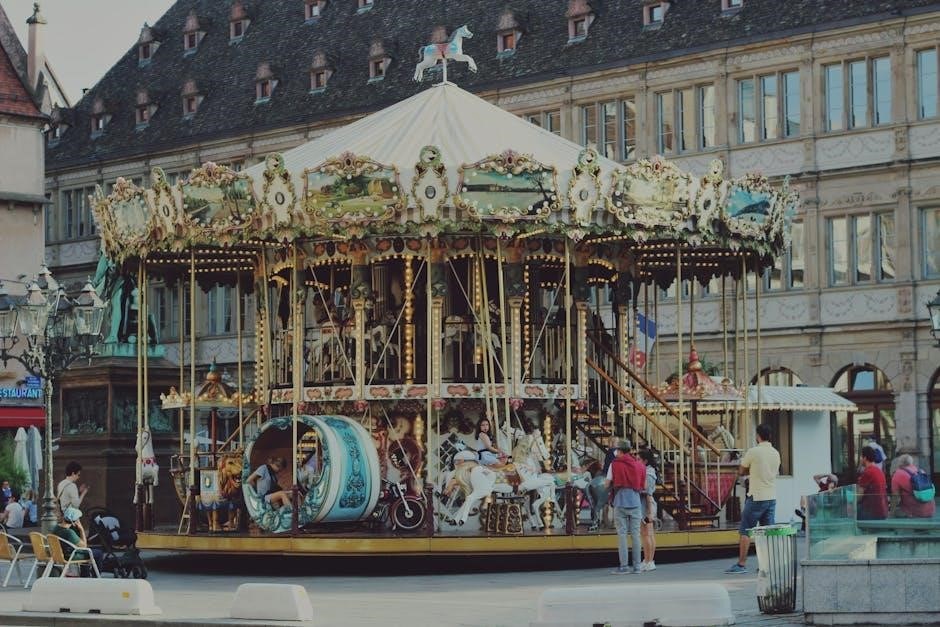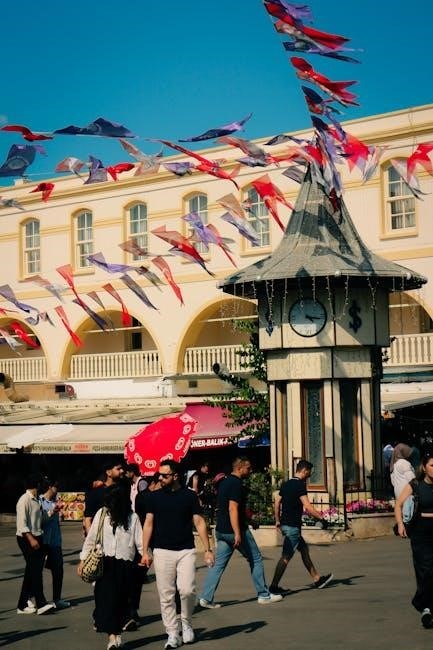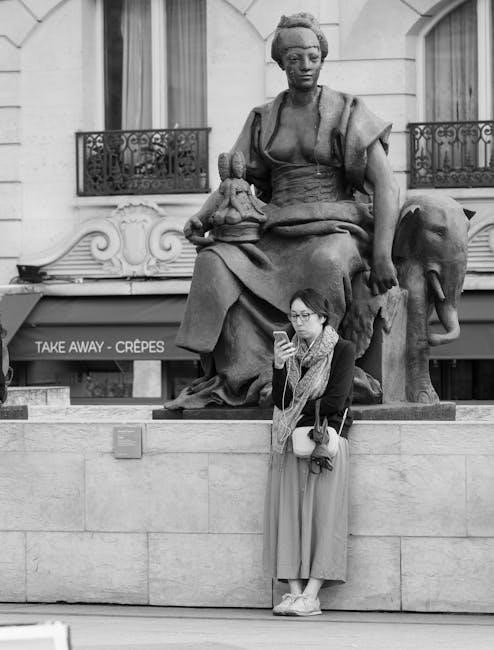Josef Pieper’s seminal work, Leisure: The Basis of Culture, explores leisure as a foundational element of human culture, contrasting it with the dominance of work in modern society․ Pieper argues that true leisure is not merely idle time but a mental and spiritual state of contemplation and celebration, essential for fostering creativity, personal fulfillment, and cultural growth․ By reexamining the balance between work and leisure, Pieper’s philosophy offers a profound critique of contemporary culture’s overemphasis on productivity, urging a rediscovery of leisure’s transformative power․
Definition and Historical Context of Leisure
Leisure, as explored in Josef Pieper’s Leisure: The Basis of Culture, is defined as a mental and spiritual state of relaxation, detachment, and celebration․ It is not merely the absence of work but a deliberate engagement with activities that foster intellectual, cultural, and spiritual growth․ Historically, leisure has been a concept tied to the Greek ideal of schole, where it was associated with intellectual pursuits and the development of the mind․ In ancient times, leisure was a privilege of the elite, allowing them to engage in philosophy, art, and civic life․ Over time, the concept evolved, with medieval thinkers linking leisure to contemplation and the pursuit of divine truth․ Pieper argues that modern society has lost sight of this profound understanding of leisure, reducing it to mere recreation or entertainment․ By revisiting its historical roots, Pieper calls for a rediscovery of leisure as a vital foundation for culture and human flourishing․
Josef Pieper’s Philosophy and Its Relevance to Modern Society
Josef Pieper’s philosophy, as outlined in Leisure: The Basis of Culture, critiques the modern world’s obsession with work and productivity․ He argues that society has forgotten the value of leisure, which he defines as a state of mental and spiritual freedom․ Pieper contends that leisure is not merely the absence of work but a positive, life-affirming state that allows individuals to engage in contemplation, art, and intellectual pursuits․ In today’s fast-paced, technology-driven world, where burnout and stress are prevalent, Pieper’s ideas resonate deeply․ He warns that the overemphasis on work leads to a dehumanizing existence, stripping life of its deeper meaning․ By advocating for a balance between work and leisure, Pieper’s philosophy offers a timeless remedy for modern society’s ills, urging individuals to reclaim leisure as a source of fulfillment and cultural renewal․ His work remains a powerful call to reevaluate priorities in an age dominated by efficiency and utility․
The Importance of Leisure in Human Life
Leisure is essential for human well-being, fostering creativity, reflection, and personal growth․ It allows individuals to recharge, pursue passions, and cultivate meaningful connections, enriching life beyond mere survival and productivity․
Leisure as a Means of Personal Fulfillment
Leisure serves as a vital pathway to personal fulfillment, enabling individuals to explore their passions and interests beyond the confines of daily routines․ Through leisure, people can engage in activities that bring joy, foster creativity, and allow for self-reflection․ Josef Pieper emphasizes that true leisure is not about idleness but about embracing a state of mind that values contemplation and celebration․ This form of leisure allows individuals to reconnect with their inner selves, leading to a deeper sense of purpose and satisfaction․ By prioritizing leisure, individuals can cultivate a richer, more balanced life, where personal growth and fulfillment are not overshadowed by the demands of work and productivity; Thus, leisure becomes an essential component of a meaningful and fulfilling human existence․
Leisure as a Catalyst for Creativity and Innovation
Leisure plays a pivotal role in fostering creativity and innovation by providing the mental space for free-thinking and imagination․ According to Josef Pieper, leisure is not merely the absence of work but a state of mind that allows individuals to engage in contemplation and exploration․ This mental freedom enables people to make novel connections and think outside conventional frameworks, leading to creative breakthroughs and innovative ideas․ Historically, many groundbreaking discoveries and artistic achievements have emerged from moments of leisure, where the mind is unencumbered by the pressures of productivity․ By prioritizing leisure, individuals and societies can cultivate an environment conducive to creativity, ensuring that innovation continues to thrive․ Without leisure, the human capacity for creativity and progress would be significantly stifled, as the mind would lack the freedom to explore and envision new possibilities․
The Psychological and Physical Benefits of Leisure Activities
Engaging in leisure activities offers numerous psychological and physical benefits that enhance overall well-being․ Psychologically, leisure provides an escape from stress, fostering relaxation and mental clarity․ Activities such as reading, music, or art allow individuals to express emotions and gain a sense of accomplishment, boosting self-esteem․ Physically, leisure can improve health by reducing chronic stress, lowering blood pressure, and strengthening the immune system․ Regular participation in hobbies or sports also promotes physical fitness and mobility․ Moreover, leisure fosters social connections, which are vital for emotional health․ By incorporating leisure into daily life, individuals can achieve a healthier work-life balance, leading to improved mental and physical health․ These benefits highlight the importance of leisure in maintaining a holistic approach to well-being, as emphasized in Josef Pieper’s philosophy, where leisure is seen as essential for a fulfilling and balanced life․
Leisure and Work: A Necessary Contrast
Leisure and work are interdependent, with leisure providing the mental and spiritual space to recharge, while work defines productivity․ Josef Pieper emphasizes that true leisure is not merely the absence of work but a state of mind that fosters reflection and celebration, essential for a balanced life․
The Overemphasis on Work in Modern Society
In contemporary society, work has become the defining feature of human life, often overshadowing other aspects of existence․ Josef Pieper critiques this trend, arguing that the overvaluation of work leads to a loss of balance and meaning․ Modern culture, driven by productivity and efficiency, has forgotten the importance of leisure as a source of fulfillment and intellectual growth․ This relentless focus on work results in burnout and the erosion of cultural and intellectual life․ Pieper asserts that work, when prioritized above all else, diminishes the human spirit and stifles creativity․ The concept of “total busyness” reflects a society where individuals are consumed by their jobs, leaving little room for contemplation or joy․ This imbalance, Pieper warns, threatens the very foundations of culture, as it neglects the essential role of leisure in fostering a rich and meaningful life․
Work-Life Balance and Its Impact on Cultural Development
Achieving a harmonious work-life balance is crucial for the flourishing of culture, as it allows individuals to engage in leisure activities that nourish the mind and spirit․ Josef Pieper emphasizes that without this balance, culture becomes stifled, as creativity and intellectual pursuits are neglected․ When individuals are overwhelmed by work, they lose the capacity for contemplation and celebration, which are essential for cultural development․ Leisure, in this context, is not merely a luxury but a necessity that fosters innovation, art, and literature․ By prioritizing leisure, society can reclaim the space for reflection and creativity, leading to a more vibrant and meaningful cultural landscape․ Pieper’s philosophy underscores the importance of restoring this balance to ensure that culture thrives, rather than merely surviving in the shadows of relentless productivity․

Leisure as a Foundation for Cultural Growth
Leisure is a cornerstone for cultural growth, fostering creativity, intellectual exploration, and the flourishing of art and literature, as highlighted in Josef Pieper’s philosophy, which views leisure as essential for societal enrichment and progress․
Leisure and the Development of Art, Music, and Literature
Leisure has historically been a catalyst for the development of art, music, and literature, as it provides the mental and spiritual space for creativity and inspiration․ In Leisure: The Basis of Culture, Josef Pieper emphasizes that true leisure is not mere idleness but a state of contemplative engagement with the world․ This mindset fosters the reflection and joy necessary for artistic expression․ Many of humanity’s greatest cultural achievements, from symphonies to novels, have emerged from moments of leisurely reflection․ For instance, composers like Mozart and writers like Shakespeare likely drew inspiration from periods of introspection and creative freedom․ Pieper argues that a society that neglects leisure risks stifling its artistic and literary progress, as the hustle of productivity leaves little room for the cultivation of beauty and meaning․ Thus, leisure is not only a personal indulgence but a societal necessity for cultural enrichment and innovation․

Leisure and the Evolution of Social Norms and Traditions
Leisure plays a pivotal role in the evolution of social norms and traditions, as it provides the space for collective reflection, celebration, and the cultivation of shared values․ In Leisure: The Basis of Culture, Josef Pieper highlights how leisure activities, such as festivals, rituals, and communal gatherings, have historically shaped societal identity and cultural practices․ These moments of leisure foster a sense of community and continuity, allowing traditions to emerge and endure․ For instance, religious holidays, cultural ceremonies, and even modern recreational practices like sports or music festivals are rooted in leisurely expressions of human connection․ Pieper argues that leisure is not merely a personal indulgence but a societal mechanism for preserving and evolving cultural norms․ By engaging in leisure, individuals and communities reinforce their values and pass them down to future generations, ensuring the vitality of cultural traditions in an ever-changing world․

Critiques and Challenges to the Concept of Leisure
Critiques of Pieper’s concept highlight economic disparities and social barriers limiting access to leisure․ Additionally, technology’s pervasive role in modern life challenges the separation of work and leisure, complicating Pieper’s ideals․
Economic and Social Barriers to Accessing Leisure

Economic and social barriers significantly limit access to leisure, undermining its universal potential․ Financial constraints, such as low income or high costs of leisure activities, prevent many from engaging in cultural or recreational pursuits․ Additionally, societal structures, like inequality and discrimination, further marginalize certain groups, denying them the opportunity to experience leisure․ Pieper’s vision of leisure as a cornerstone of culture is thus challenged by these systemic issues, which disproportionately affect disadvantaged communities․ Without addressing these barriers, the ideal of leisure remains inaccessible to many, perpetuating social divides and limiting cultural enrichment․ These challenges highlight the need for equitable solutions to ensure leisure is not a privilege but a right for all․
The Role of Technology in Shaping Modern Leisure
Technology has profoundly transformed modern leisure, offering unprecedented opportunities for entertainment, connectivity, and creativity․ Digital platforms enable global access to cultural content, fostering a more interconnected world․ However, this technological advancement also raises concerns about the quality and depth of leisure experiences․ While virtual realities and social media provide new ways to engage in leisure, they often lead to superficial interactions and a loss of meaningful contemplation․ Pieper’s emphasis on leisure as a space for reflection and cultural enrichment is challenged by the constant distractions and fragmented nature of digital leisure․ Moreover, the blurring of boundaries between work and leisure, exacerbated by technology, risks reducing leisure to mere consumption rather than a source of intellectual and spiritual renewal․ Balancing the benefits and pitfalls of technology is essential to preserve leisure’s role in fostering authentic cultural growth and personal fulfillment․

As the world evolves, leisure remains a vital foundation for culture, requiring a balance between tradition and innovation․ Pieper’s insights remind us to cherish leisure as a sustainable source of fulfillment and cultural renewal․
Reimagining Leisure in the Digital Age
The digital age presents both opportunities and challenges for redefining leisure․ Technology offers unprecedented access to virtual entertainment, global connectivity, and creative tools, enabling new forms of leisure that transcend physical boundaries․ However, the constant availability of digital distractions risks blurring the line between work and leisure, potentially undermining the contemplative essence of true leisure․ Pieper’s philosophy emphasizes the need to reclaim leisure as a space for reflection and cultural enrichment, even amid technological advancements․ By thoughtfully integrating digital tools into leisure practices, individuals can harness their potential to enhance creativity, foster community, and deepen personal fulfillment, ensuring that leisure remains a vibrant foundation for culture in the modern world․
Leisure as a Sustainable Foundation for Future Cultures

Leisure, as a cornerstone of culture, holds the key to sustainable cultural development․ By fostering creativity, reflection, and community bonding, leisure ensures that cultures remain vibrant and adaptive․ In an era marked by rapid technological change and environmental challenges, the principles outlined in Josef Pieper’s Leisure: The Basis of Culture offer a timeless guide․ Sustainable cultures require a balance between productivity and leisure, allowing individuals to recharge, innovate, and connect on a deeper level․ As societies move forward, prioritizing leisure can help preserve cultural heritage while nurturing new expressions of art, music, and literature․ This balance not only enriches individual lives but also fosters resilience and harmony within communities, ensuring that future cultures thrive on a foundation of both tradition and innovation․